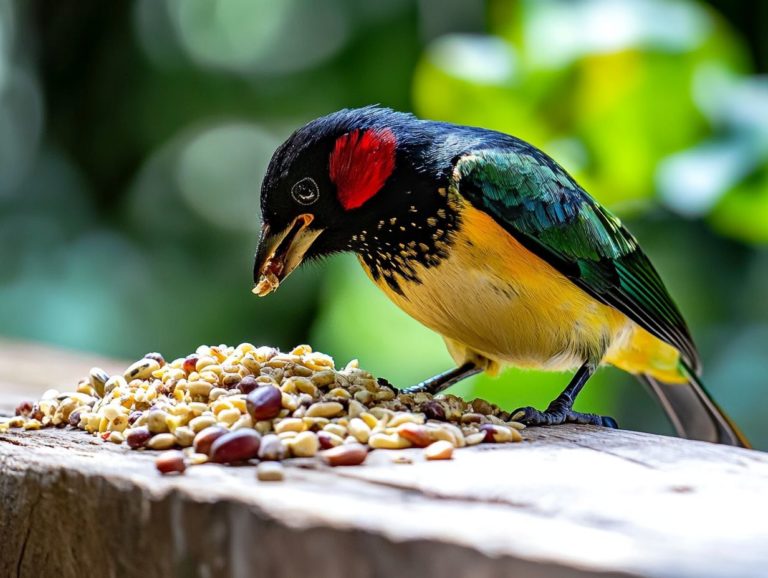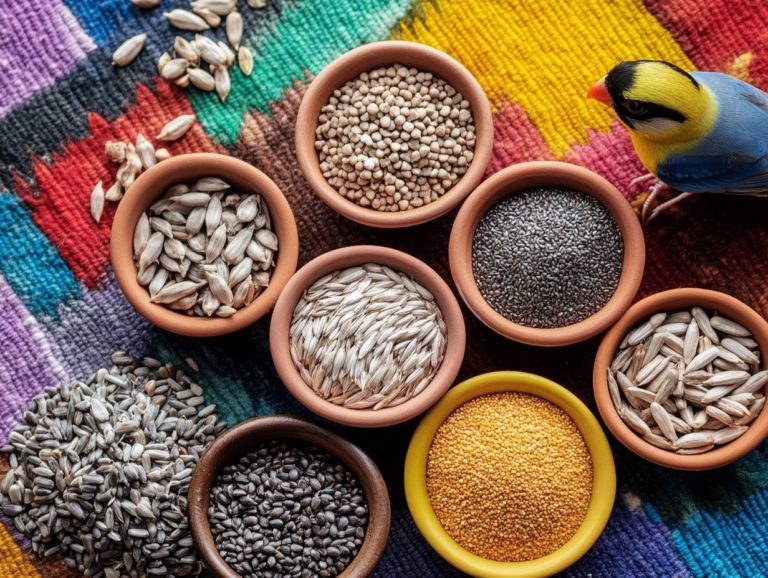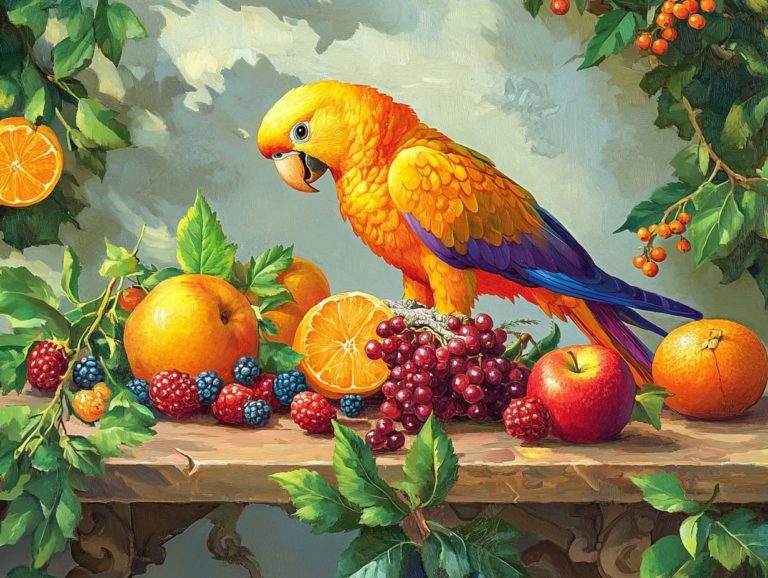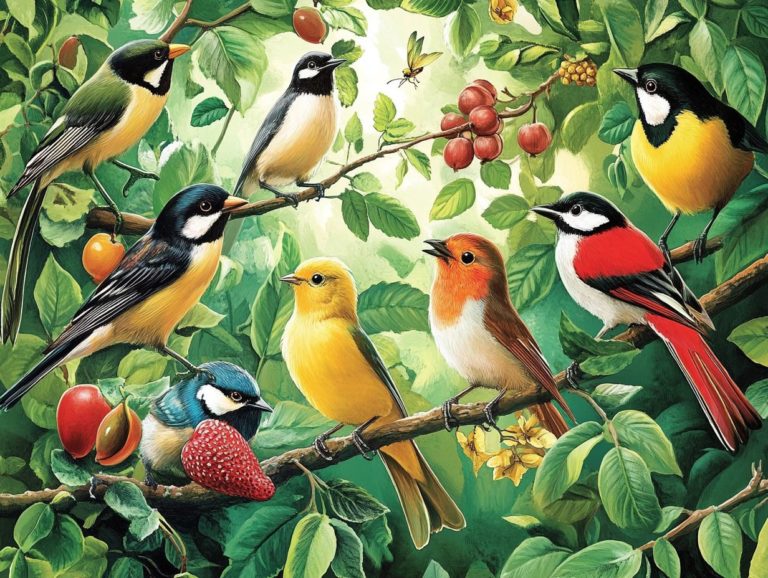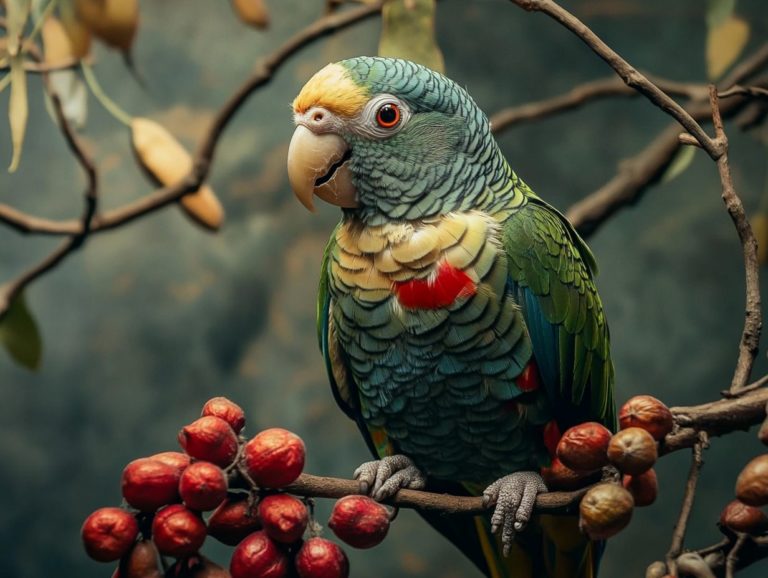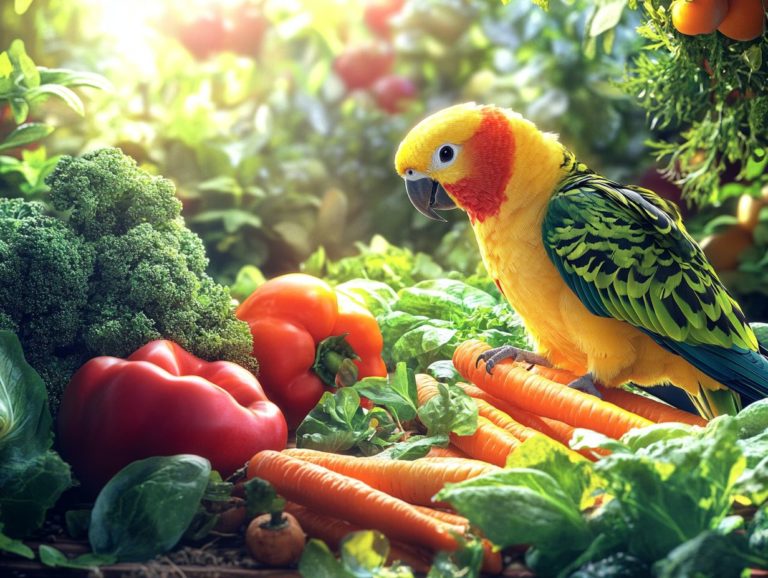5 Best Bird Food Choices for Small Birds
Feeding small birds can be a truly delightful experience. It s not just for your feathered visitors but for you as well. Selecting the right bird food type is vital for their health and overall well-being.
Consider these top five food choices ranging from black oil sunflower seeds to dried mealworms that will keep your tiny guests happy and thriving.
- Sunflower seeds
- Dried mealworms
- Nyjer seeds
- Peanuts
- Suet
It s essential to offer a varied diet and be aware of signs of malnutrition. Steer clear of common feeding mistakes and discover effective tips for attracting these charming creatures to your feeder.
Get ready to transform your bird-feeding experience into something extraordinary!
Contents
- Key Takeaways:
- 1. Sunflower Seeds
- 2. Millet
- 3. Nyjer/Thistle Seeds
- 4. Safflower Seeds
- 5. Dried Mealworms
- The Importance of Providing a Varied Diet for Small Birds
- Frequently Asked Questions
- What are the 5 best bird food choices for small birds?
- Why are sunflower seeds a good choice for small birds?
- What makes millet a popular option for small bird food?
- Why should nyjer seeds be included in a small bird’s diet?
- How does suet benefit small birds?
- Can dried insects be a part of a small bird’s diet?
Key Takeaways:
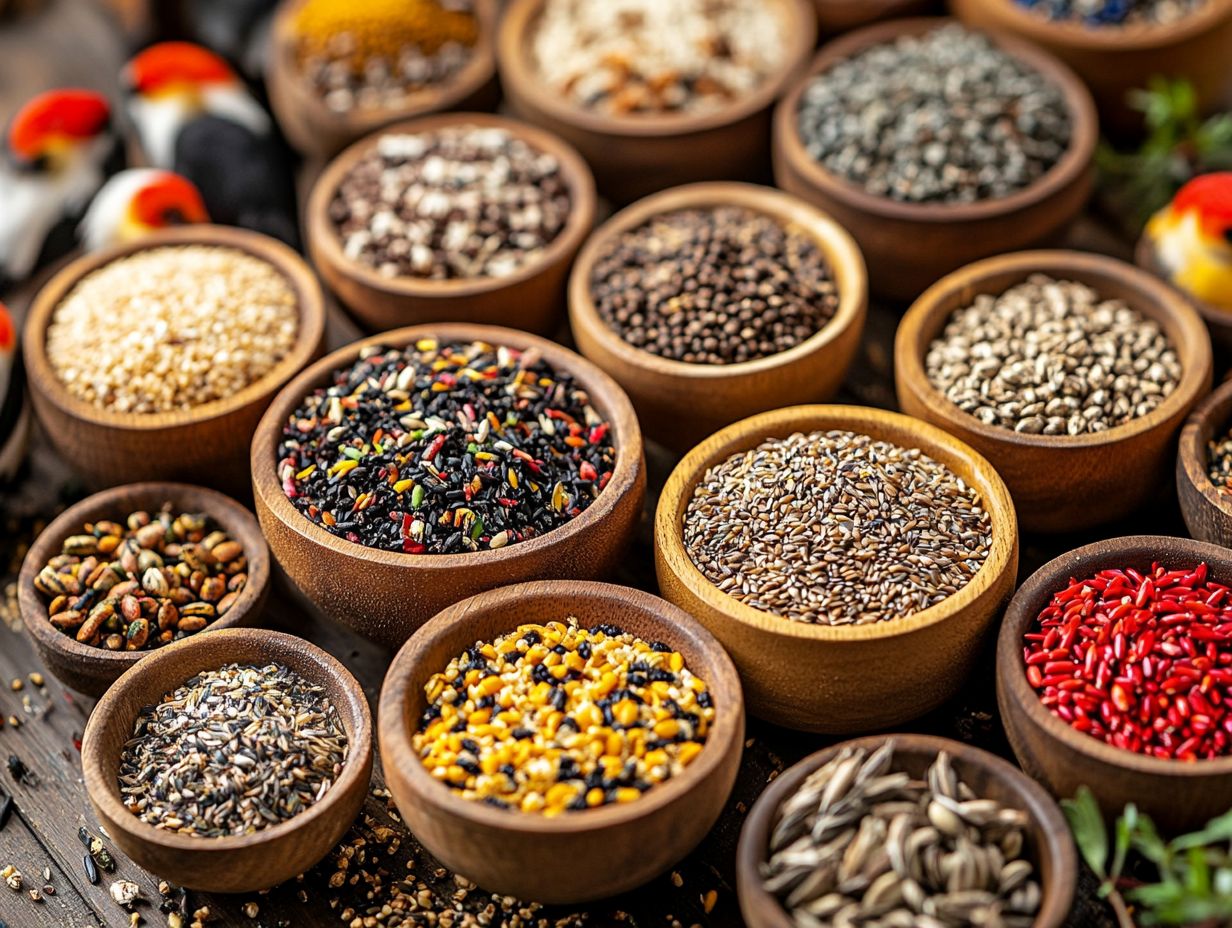
- Sunflower seeds are a top choice for small birds, packed with essential nutrients and easy to crack open.
- Millet is another great option, providing carbohydrates and protein for energy and growth.
- Nyjer or thistle seeds are ideal for finches and other small birds, rich in fat and oil for energy.
1. Sunflower Seeds
Sunflower seeds rank among the most sought-after bird foods, especially the black oil variety. This variety draws in a delightful array of birds like woodpeckers, chickadees, and jays. These seeds are a great source of nutrition, offering the essential fats and proteins that birds need to flourish.
By filling your bird feeders with sunflower seeds, you can enhance the diversity of species visiting your yard and cultivate a lively ecosystem. Selecting high-quality seeds is vital; always opt for fresh, plump, and oil-rich varieties for optimal results.
Cardinals, finches, and sparrows also find these delectable treats irresistible, making them a mainstay in many outdoor settings.
To boost feeding efficiency and reduce waste, consider employing tube feeders that limit seed spills or tray feeders with raised edges to keep seeds contained. Regularly cleaning and refilling the feeders attracts more birds and ensures they have a safe and welcoming dining area.
By adopting these practices, you’ll create an inviting habitat that nurtures healthy bird populations.
2. Millet
Millet, especially white proso millet, is a remarkable choice for your bird feeders. It expertly attracts ground-feeding birds like sparrows, robins, and wrens. This tiny seed delivers a nutritional balance that supports the vitality and energy of these delightful species. For an even better diet, consider incorporating 5 superfoods for a healthier bird, making it a must-have at your backyard feeding station.
Incorporating millet into your bird feeding routine is easy. Mix it with a blend of other seeds or offer it solo. This versatile seed appeals to small songbirds and entices larger visitors such as quails and doves.
For the best results, consider using tube feeders with wide openings or ground feeders that provide easy access for these birds while keeping larger species at bay. To further thwart squirrels from pilfering your millet stash, think about investing in squirrel-proof feeders or using devices that prevent squirrels from reaching the food.
Maintaining a pristine feeding area by regularly clearing away old seeds and debris is essential. This simple practice helps prevent the spread of disease among birds, ensuring a vibrant and healthy backyard habitat for all your feathered friends.
3. Nyjer/Thistle Seeds
Nyjer seeds are a favorite among bird lovers. These tiny seeds are packed with energy and nutrients!
Birds, especially finches like the American Goldfinch and Pine Siskin, find them irresistible. The best feeders for nyjer seeds include:
- Tube feeders with small drainage holes to keep seeds dry.
- Special mesh feeders that let birds cling comfortably while they eat.
Place your feeders in quiet, sheltered spots to attract these vibrant birds. Clean your feeders regularly to keep the seeds fresh and boost your chances of a lively feeding experience!
4. Safflower Seeds
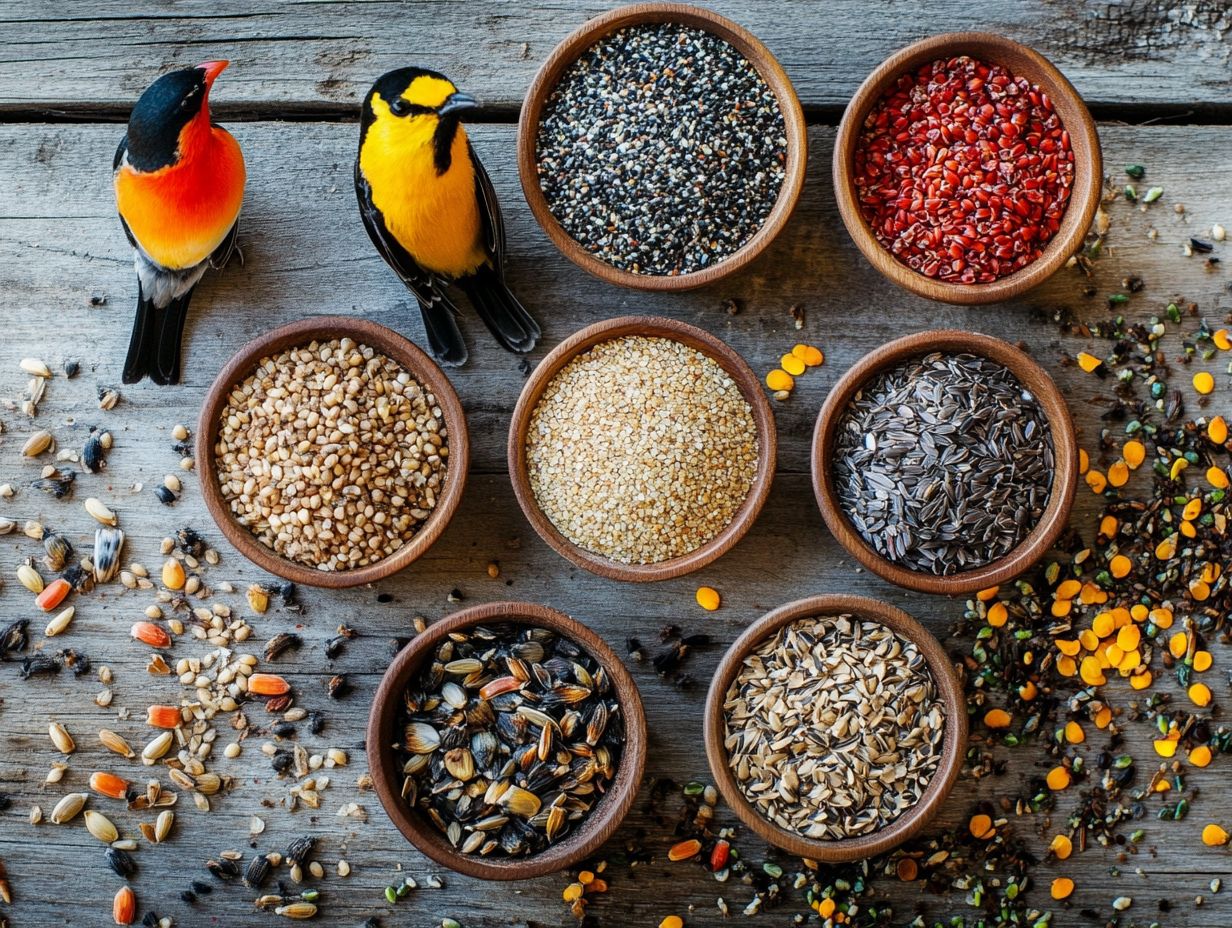
Safflower seeds are a superb alternative to traditional birdseed. They attract blue jays and other birds while keeping squirrels at bay.
These seeds are rich in protein and oil, providing essential nutrients for your feathered friends. Fill your feeders only halfway to minimize waste and ensure a fresh supply for hungry visitors.
Regularly cleaning your feeders is vital. It prevents the growth of mold and bacteria, enhancing the food’s appeal. Consider using feeders designed to outsmart squirrels think weight-sensitive perches!
5. Dried Mealworms
Dried mealworms serve as a nutritious delicacy for birds. They are particularly effective in attracting delightful woodpeckers and nuthatches, who thrive on high-protein diets.
Adding dried mealworms to your feeding routine boosts the health and energy of many birds. Beyond woodpeckers and nuthatches, many songbirds like blue jays and chickadees find mealworms to be an irresistible treat.
Store mealworms in a cool, dry place, ideally in an airtight container to keep them fresh. Pairing mealworms with other bird foods, such as seed mixes or suet, diversifies their diet and attracts a wider array of bird species.
The Importance of Providing a Varied Diet for Small Birds
Providing a varied diet for small birds is essential for their health and well-being. For instance, knowing the 5 favorite foods of pet birds can help ensure that different seeds and foods cater to the unique nutritional needs of various species.
By offering an enticing range of options like black oil sunflower seeds, safflower seeds, nyjer seeds, and even mealworms you can attract an impressive array of visitors, including sparrows, finches, and woodpeckers.
This not only elevates your birdwatching experience but also contributes to a healthier ecosystem right in your backyard. Integrating seeds with fruits, vegetables, or specially formulated pellets enhances their diet, ensuring they receive essential vitamins and minerals.
Observe their feeding preferences to gain insights into which birds frequent your area. Some may be drawn to the high-fat content of sunflower seeds, while others thrive on protein-packed mealworms.
Experiment with different combinations and replenish the food regularly to keep those feathered friends returning. Maintaining a clean feeding station is key; it supports the overall health of your avian visitors and helps prevent the spread of diseases among them.
What Other Foods Can Small Birds Eat?
Plus seeds, small birds thrive on a delightful variety of foods, such as peanut butter, cornmeal, and fresh fruit. These options provide essential nutrients and energy. For lovebirds specifically, consider the 5 best foods for lovebirds. Adding suet during the cooler months can elevate your feeding station, attracting a wider range of species and enhancing their dietary options.
When you offer sunflower hearts, you re not just providing a treat; you re delivering healthy fats that support their energy needs. Mealworms are a protein-packed delight that birds find irresistible.
To lure a diverse array of birds to your yard, present fruits like apples and berries in an accessible manner whether diced on a platform feeder or artfully arranged on a skewer.
Maintain a clean feeding environment by regularly cleaning your feeders and promptly removing any uneaten food to prevent mold and pests. Also, consider placing your feeders in safe, sheltered spots where birds feel secure. This enhances their feeding experience and gives you fantastic opportunities for observation.
How Often Should Small Birds Be Fed?
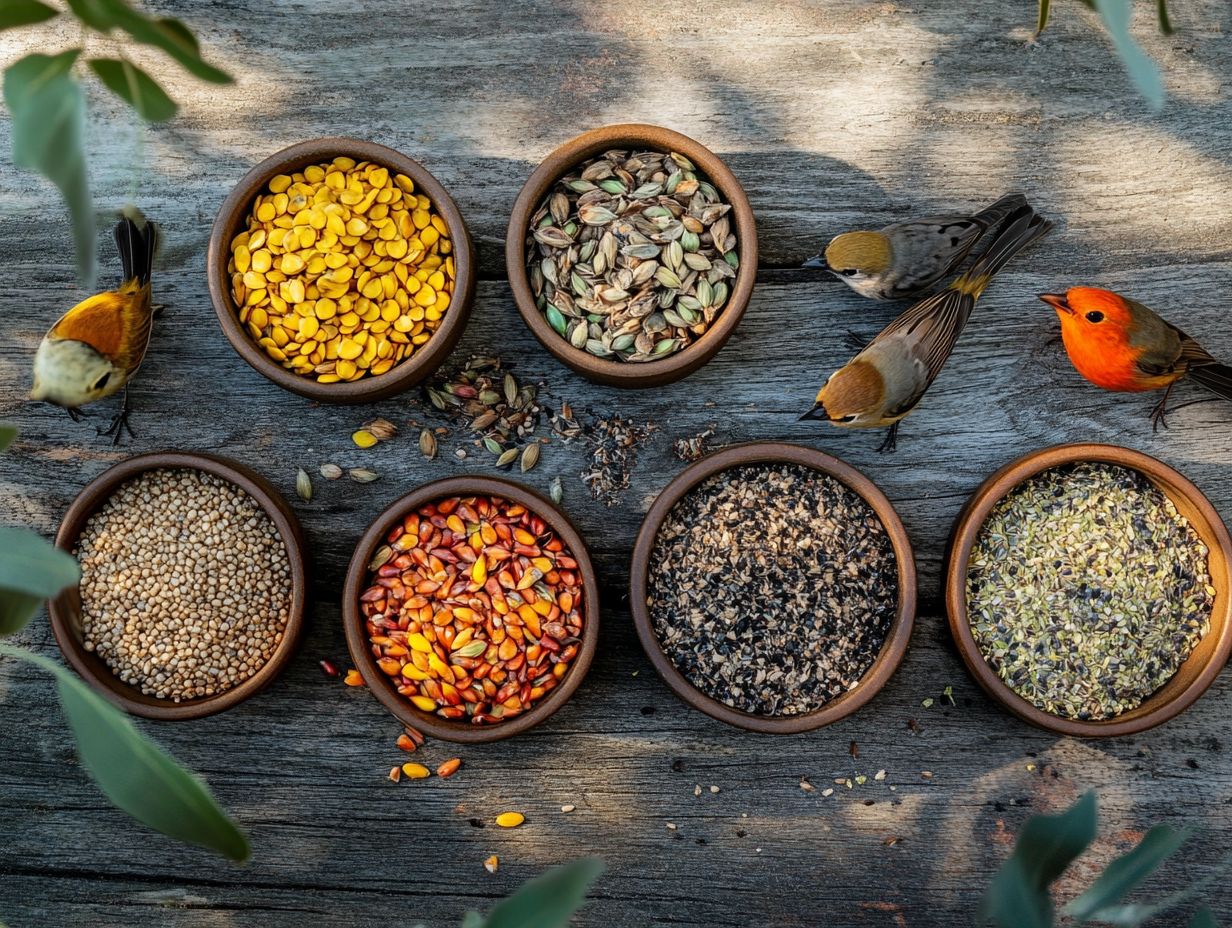
To ensure the health and well-being of small birds, establish a consistent feeding schedule that harmonizes with their natural behaviors and seasonal shifts. Regularly replenishing feeders and keeping them clean prevents waste, promotes healthy eating habits, and attracts a wider variety of birds to your yard.
Knowing your local birds will help you attract more! During migration seasons, you might notice increased activity, prompting you to refill feeders more frequently. Make it a habit to check your feeders every few days to keep your feathered friends happy, adjusting as necessary based on food consumption and weather conditions.
Cleaning the feeders every two weeks is crucial to prevent mold and disease, ensuring the safety of the birds that visit. You can also use seed guards, which help prevent food spillage, or specialized feeders to reduce waste. By paying attention to these details, you can create an environment that attracts vibrant birdlife, transforming your yard into a rewarding sanctuary.
What Are the Signs of Malnutrition in Small Birds?
Recognizing the signs of malnutrition in small birds is crucial for ensuring their well-being, especially for ground-feeding species that might struggle to access a varied diet. Look for symptoms like lethargy, feather loss, and behavioral changes. These are clear indicators that they may not be getting the nutrition they need from the seeds offered in feeders.
Stay vigilant and take note of any unusual behaviors, such as excessive preening or a reluctance to fly. Offering a diverse mix of seeds, fruits, and vegetables can significantly enhance the nutritional offerings available to these birds. You can also introduce high-protein options, like mealworms or specialized suet blocks, to attract a wider variety of birds while providing essential nutrients. For those looking to get creative, try out these easy recipes for homemade bird treats.
By keeping feeders clean and consistently stocked, you can encourage these feathered friends to return, optimizing their health and vitality.
What Are the Common Mistakes When Feeding Small Birds?
Many bird enthusiasts like yourself often fall into common traps when feeding small birds, such as neglecting to keep feeders clean, offering only one type of seed, or failing to monitor the freshness of the food. These missteps can lead to waste and may discourage birds from visiting, ultimately diminishing your enjoyment of the birdwatching experience in your own backyard.
To create an inviting space for your feathered friends, it’s essential to diversify your food offerings. Different bird species have varied dietary needs, so including an assortment of seeds, nuts, and 5 quick tips for feeding your bird can attract a wider array of birds to your feeders.
Maintaining clean feeders is critical; moldy or contaminated food can harm the birds and drive them away. Regular maintenance is vital check your feeders for wear and refill them promptly to ensure a consistent food supply.
By addressing these common pitfalls, you can significantly elevate your birdwatching experience, cultivating a vibrant habitat right outside your window.
How Can One Attract Small Birds to Their Feeder?
Attracting small birds requires a thoughtful approach. Additionally, considering the 5 best feeding practices for pet birds can help you select the finest birdseed to appeal to various species.
Provide a diverse range of food types. Keep feeders clean and place them in optimal locations. By doing so, you can significantly boost your chances of welcoming a delightful assortment of birds to your backyard!
Choose the right seed blends, like sunflower seeds, millet, or nyjer. These cater to the unique tastes of different birds. Additionally, incorporating the 5 best protein sources for pet birds can enhance their diet. Feeders designed for specific seeds reduce waste and help birds access their favorite treats easily.
Positioning your feeders near bushes or trees creates a sanctuary for birds, encouraging them to visit regularly. Regularly cleaning your feeders eliminates mold and prevents disease, creating a healthier space that attracts more birds.
By implementing these strategies, you turn your yard into a vibrant bird haven!
Frequently Asked Questions
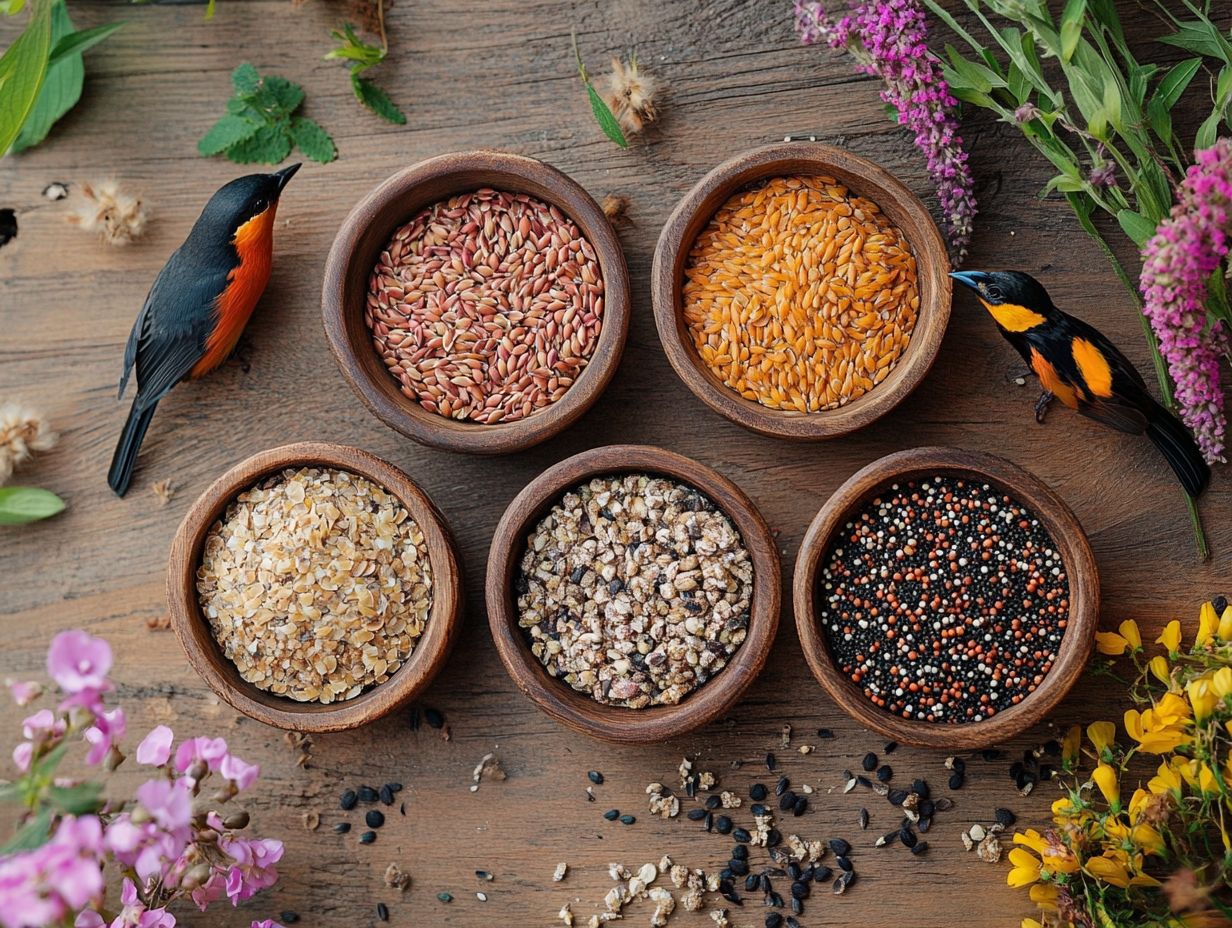
What are the 5 best bird food choices for small birds?
The top five options are: sunflower seeds, millet, nyjer seeds, suet, and dried insects.
Why are sunflower seeds a good choice for small birds?
Sunflower seeds are high in healthy fats and protein, making them a great source of energy for small birds, but it’s also important to consider the best pellets for pet birds to ensure a balanced diet.
What makes millet a popular option for small bird food?
Millet is a small, easily digestible grain that is suitable for a variety of small bird species and can be found in many pre-mixed bird seed blends.
Why should nyjer seeds be included in a small bird’s diet?
Nyjer seeds are especially appealing to small birds like finches and help provide essential nutrients for their overall health.
How does suet benefit small birds?
Suet is a high-energy food that is ideal for small birds, especially during harsh winter months when other food sources may be scarce.
Can dried insects be a part of a small bird’s diet?
Yes, dried insects such as mealworms or crickets can be a great source of protein for small birds and should be offered as a treat in moderation.

